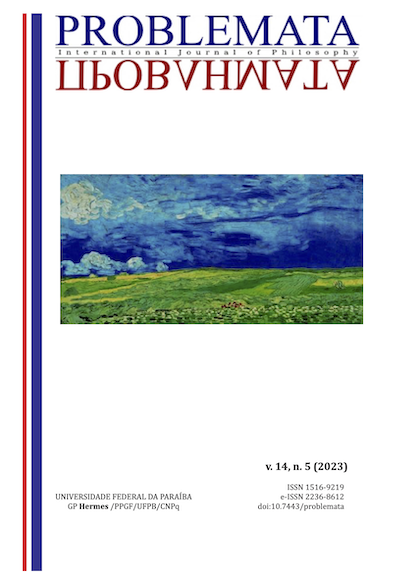CONCORDANCE OF THE CONTRASTS MYTHOS AND LOGOS, RE-VISITED IN DIATOPIAS
DOI:
https://doi.org/10.7443/problemata.v14i5.68350Keywords:
Agreement, Opposites, Mythos, Logos, DiatopíasAbstract
Concordance of Contraries is a prayer of action by Heraclitus of Ephesus, the Dark One of ancient philosophy; complex, in which Edgar Morín has said that he constantly returns to the philosopher in his works, in the principles of complexity theory. In the lines of research: Complex transmethodologies and planetary-complex decolonial transmethods, Planetary Decolonial Education - complex transepistemologies, and planetary decoloniality-complexity in re-linking, the complex objective of analyzing the agreement of the contrary mythos and logos re-visited in diatopias, we do it from comprehensive ecosophical and diatopic hermeneutics as a transmethod. We go through the analytical, empirical and propositional moments. In the propositional moment we have evidenced the agreement mythos – logos from the agreement of the topoi that would encourage their relationality, so that from the planetary decoloniality-complexity the complexity and respect for the nature of life is a purpose that in the Complex Planetary Decolonial Education. It is that in the concordances of the opposites that come from the consideration that the mythos and logos do not communicate, then we must give essences to break that abysmal thought so that we can finally communicate said topoi.
Downloads
References
AGUILERA, Sebastián, La política del lógos: reflexiones sobre el pensamiento político de Heráclito de Éfeso, Byzantion Nea Hellás, no 32: 11-33, 2013.
AGUILERA, Sebastián, Dios, logos y fuego en Heráclito, Byzantion Nea Hellás, N.33, pp.11-27, 2014.
DELEUZE, Guilles; GUATTARI, Félix, Mil Mesetas. Capitalismo y Esquizofrenia, Valencia: Pre-textos, 1980.
FANÓN, Frantz, Piel negra, máscaras blancas, Madrid: Akal, 2016.
FERNÁNDEZ, Gustavo, Heráclito: Naturaleza y complejidad, Sevilla: Ediciones Thémata, 2010.
FERNÁNDEZ, Gustavo, Lo divino como resolución de la oposición en el pensamiento de Heráclito, Fragmentos de filosofía, N. 9, pp. 97-116, 2011.
FERNÁNDEZ, Gustavo, La trama sin tejer: notas sobre el lenguaje de Heráclito, Estudios Filosóficos, vol. LXIX: 395 – 409, 2020.
FORNET-BETANCOURT, Raúl, Lo intercultural: el problema de su definición. En Interculturael. Balance y perspectivas, Encuentro internacional sobre Interculturalidad”. Barcelona: Fundación CIDOB: 157-160, 2011.
GADAMER, Hans-Georg, Mito y razón, Barcelona: Ediciones Paidós, 1997
HÜLSZ, Enrique, Nuevos ensayos sobre Heráclito, Actas del 2° Symposium Heracliteum, México D. F: UNAM, 2009.
INGALA, Emma, La complejidad y el pensamiento de Gilles Deleuze, Δα´ιμων. Revista de Filosofía, no1: 255-261, 2008.
JAEGER, Werner, Paideia, los ideales de la cultura griega, México D. F.: Fondo de Cultura Económica, 2006.
JAEGER, Werner, La teología de los primeros filósofos, México D. F.: Fondo de Cultura Económica, 2013
MARCOVICH, Miroslav, Heraclitus: Editio Maior, Merida: The Los Andes University Press, 1967.
MIGNOLO, Walter, La opción decolonial: desprendimiento y apertura. Un manifiesto y un caso, Tabula Rasa, no. 8: 243-282, 2008.
MORÍN, Edgar, El método IV: Las ideas, Madrid, Cátedra, 1991.
MORÍN, Edgar, Mis demonios, Barcelona: Kairós, 1995.
MORÍN, Edgar, El Método III. El conocimiento del conocimiento, Madrid: Cátedra, 1988.
MORÍN, Edgar, La cabeza bien puesta. Repensar el pensamiento, Buenos Aires: Editorial Nueva Visión, 2002.
PANIKKAR, Raimón, El Cristo desconocido del hinduismo, Madrid: Marova, 1970.
PANIKKAR, Raimón, Sobre el diálogo intercultural, Salamanca. Editorial San Esteban, 1990.
PANIKKAR, Raimón, El silencio de Buddha: una introducción al ateísmo religioso, Madrid: Ediciones Siruela, 2005.
PANIKKAR, Raimón, Mito, fe y hermenéutica, Barcelona: Herder, 2007.
PANIKKAR, Raimón, Ecosofía la sabiduría de la tierra, Barcelona: Fragmenta Editorial, 2021.
PIERRE VERNANT, Jean, Mito y sociedad en la Grecia antigua, Madrid: Ediciones Siglo XXI, 1943.
RODRÍGUEZ, Milagros Elena, Re-ligar como práctica emergente del pensamiento filosófico transmoderno, ORINOCO Pensamiento y Praxis, no 11: 13-3, 2019. https://doi.org/10.5281/zenodo.3709211
RODRÍGUEZ, Milagros Elena, La hermenéutica comprensiva, ecosófica y diatópica: un transmétodo rizomático en la transmodernidad, Revista Perspectivas Metodológicas, vol.19: 1-15, 2020a. https://doi.org/10.18294/pm.2020.2829.
RODRÍGUEZ, Milagros Elena, Heráclito De Éfeso en la complejidad Moríniana: una filosofía que despertó sentires, Problemata Revista Internacional de Filosofía, vol. 13, no 3: 85-96, 2022a. https://doi.org/10.7443/problemata.v13i3.64006
RODRÍGUEZ, Milagros Elena, Transepistemes de la concepción compleja del ser humano: naturaleza-cuerpo-mente-espíritu-Dios, Revista PerCursos, vol.23, no 53: 157-179, 2022b. https://doi.org/10.5965/1984724623532022157
RODRÍGUEZ, Milagros Elena, La Educación Planetaria Decolonial en Edgar Morín: aportes y transmétodo, Cadernos De Pesquisa, vol.29, n0 4: 29–51, 2022c. https://doi.org/10.18764/2178-2229v29n4.2022.58
RODRÍGUEZ, Milagros Elena. Inhuman humanism: rhizomatic deconstruction from planetary decoloniality – complexity, Revista Sem Aspas, vol 12, no e023002: 1-24, 2023a. https://doi.org/10.29373/sas.v12i00.17787.
RODRÍGUEZ, Milagros Elena, El cero (0) no tan neutro en la Educación Decolonial Planetaria Compleja, Práxis Educativa, vol, 18, e21287: 1-14, 2023b. https://doi.org/10.5212/PraxEduc.v.18.21287.017
SPENGLER, Oswald, Heráclito, Sevilla: Ediciones Espuela de Plata, 2013.
SOCIEDADES BÍBLICAS UNIDAS, Santa Biblia, Caracas: Versión Reina-Valera, 1960.
ZUBIA, Gonzalo, Las trampas de la identidad bajo el designio del logos, Polis, no.38: 1-17, 2014.
Downloads
Published
Issue
Section
License
Copyright (c) 2024 Milagros Elena Rodriguez

This work is licensed under a Creative Commons Attribution 4.0 International License.
Authors who publish with this journal agree to the following terms:
- Authors retain copyright and grant the journal right of first publication with the work simultaneously licensed under a Creative Commons Attribution License that allows others to share the work with an acknowledgement of the work's authorship and initial publication in this journal.
- Authors are able to enter into separate, additional contractual arrangements for the non-exclusive distribution of the journal's published version of the work (e.g., post it to an institutional repository or publish it in a book), with an acknowledgement of its initial publication in this journal.
-
- Authors are permitted and encouraged to post their work online (e.g., in institutional repositories or on their website) prior to and during the submission process, as it can lead to productive exchanges, as well as earlier and greater citation of published work (See The Effect of Open Access).





